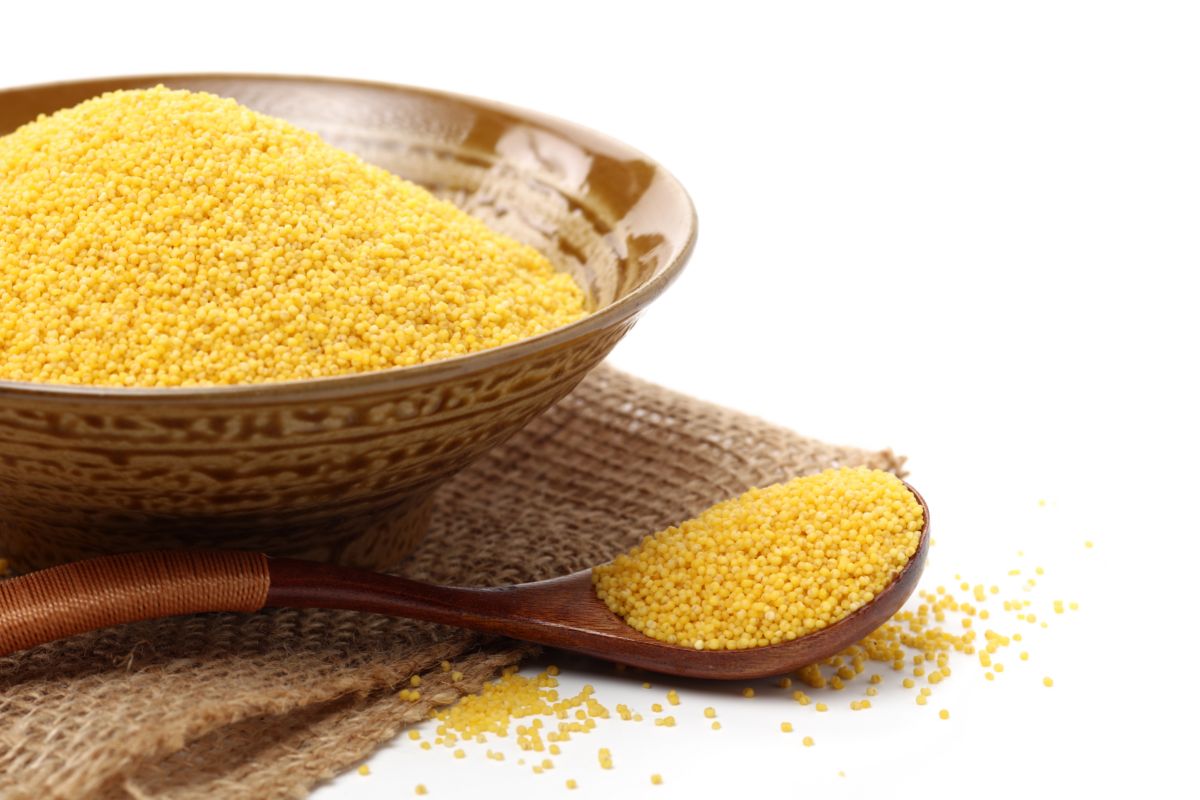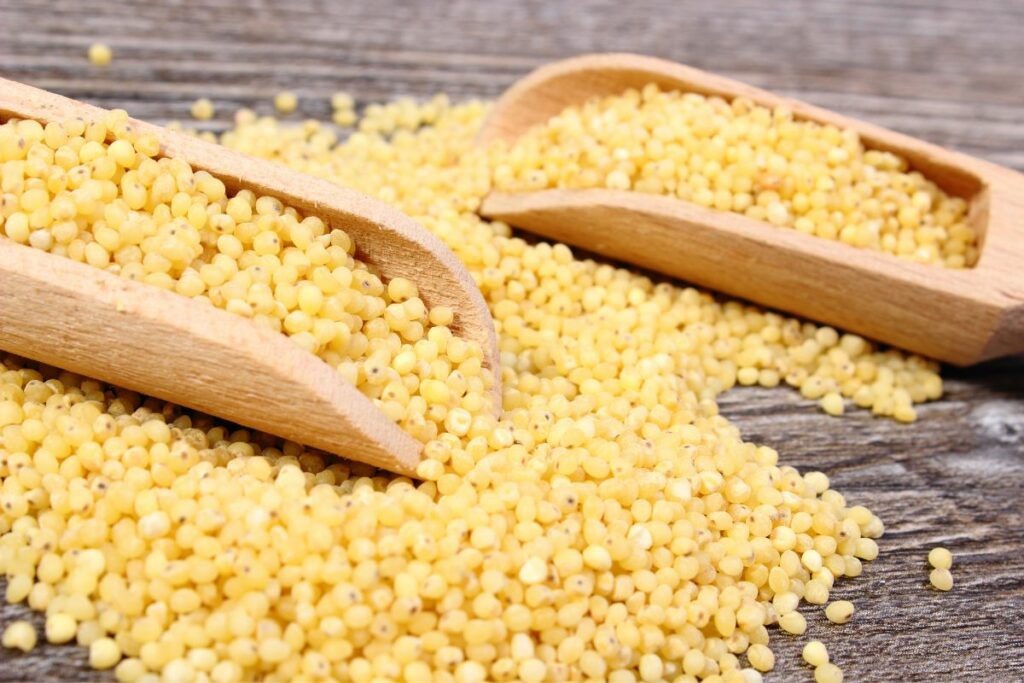Millets are grain-like seeds used in many diets throughout the world, and the health benefits are numerous and well documented.
Despite the advantages, millet can unfortunately also be the cause of digestive woes for many individuals.
In many cases, millets have been linked with certain digestive side effects such as constipation, bloating, and cramping.
The news is not all bad, however, there are a few tips that you can use when consuming millet in order to prevent these symptoms from occurring.
If you’re considering adding millets to your diet but want to avoid experiencing any digestive issues, then read on for some easy tips and tricks on how to prevent millets from causing you any discomfort.
What Are Millets?
Millets are small, round grains that have been used as a staple food in many parts of the world for centuries.
They are highly nutritious and contain a variety of vitamins and minerals, as well as being high in fiber.
Millets can be cooked in a variety of ways, such as boiling, steaming, or baking, and can be used to make bread, oatmeal, and other dishes.
Millets offer a wide range of benefits to overall health, and these include:
Improved Digestion
When consumed in the proper quantities and according to the guidance we will explore momentarily, millets can actually have a positive role in helping your digestive system to function effectively.
Millets are high in fiber, which helps to keep your digestive system functioning properly and prevents constipation.
Reduce Cholesterol Levels
Millets are also high in magnesium, which helps to reduce cholesterol levels and improve heart health.
Magnesium helps to reduce the amount of bad cholesterol (LDL) in your body and increase the amount of good cholesterol (HDL), offering amazing benefits to overall health and well-being.
Improved Blood Sugar Levels
Millets are also a great source of complex carbohydrates, which help to regulate blood sugar levels and prevent spikes in blood sugar.
This can help to reduce the risk of developing diabetes and other related health conditions, as well as allow you to stay healthy.
What Is Constipation?

Constipation is a condition where the stool becomes hard and difficult to pass, leading to discomfort and pain. It can be caused by a variety of factors, including diet, lifestyle, and medications.
Symptoms of constipation include abdominal pain, bloating, nausea, and feeling full after eating only a small amount of food.
If you experience any of these symptoms, it is important to speak to your doctor to determine the cause and find the best treatment.
How To Reduce Constipation Caused By Millets
Constipation can be an unwanted side effect of consuming millet, but there are steps that you can take to reduce this risk, and we took a closer look at these below.
1. Increase Your Water Intake
Millets are high in fiber, which can cause dehydration if not enough water is consumed.
One of the best ways to prevent millets from causing constipation is to increase your water intake – staying hydrated helps your digestive system by keeping your stools soft and easy to pass.
Make sure you’re drinking at least 8 glasses of water a day when consuming millet to keep your body hydrated and your digestive system functioning properly.
2. Eat Millet In Moderation
Eating too much of any food can cause digestive issues, and millets are no exception.
Try to limit your consumption of millet to one or two servings a day in order to avoid any potential digestive problems.
3. Include Other High-Fiber Foods
Eating other high-fiber foods along with millet can help prevent constipation by providing your body with a variety of different fibers.
Try to include other sources of fiber such as fruits, vegetables, and whole grains in your diet to keep your digestive system functioning properly, and make sure that you have a well-balanced diet packed with fruit and veg to give your body all the nutrients it needs.
4. Soak Millets Before Eating
Soaking millets before eating them can help reduce the amount of phytic acid they contain, which can cause constipation and other digestive issues.
To soak millets, simply add them to a bowl of water and let them sit for 8–12 hours before cooking.
5. Exercise Regularly
It may seem unconnected, but exercising regularly can help keep your digestive system functioning properly by stimulating the muscles in your intestines.
Aim to get at least 30 minutes of exercise a day in order to keep your digestive system healthy and prevent constipation caused by millet – this will also help you to stay fit and healthy.
6. Probiotics And Laxatives
In some cases, probiotics and laxatives can help to reduce constipation caused by millet.
Probiotics are beneficial bacteria that can help to improve your digestive health, while laxatives can help to stimulate the muscles in your intestines and make it easier for stools to pass.
However, these should only be used as a last resort – try the other methods above first before considering taking probiotics or laxatives.
7. Eat Millets With Other Foods
Eating millet with other foods can help to reduce the risk of constipation, as different foods can have different effects on your digestive system.
Try to eat millets with other high-fiber foods such as fruits and vegetables, as well as healthy fats like nuts and seeds – this will help to keep your digestive system functioning properly and prevent constipation.
Is Constipation Dangerous?
Constipation can be uncomfortable and inconvenient, but it is usually not dangerous.
However, if left untreated it can lead to more serious health problems such as hemorrhoids, anal fissures, and rectal prolapse.
If you experience any of these symptoms or if your constipation persists for more than a few days, it is important to speak to your doctor in order to determine the cause and find the best treatment.
Are There Any Other Downsides To Eating Millets?

In addition to causing constipation, eating too much millet can have some unwanted health effects, and these include:
Antinutrients
Millet contains antinutrients, which can interfere with the absorption of certain vitamins and minerals. This means that eating too much millet can lead to nutrient deficiencies.
Weight Gain
Though millet is most commonly associated with weight loss, the grain is high in calories and carbohydrates, which can lead to weight gain if eaten in excess.
It is important to keep your portion sizes under control and combine millet with other healthy foods in order to maintain a balanced diet.
Risk Of Allergy
Though extremely rare, it is important to recognize that it is possible to be allergic to millet.
If you experience any symptoms such as hives, swelling, or difficulty breathing after eating millet, it is important to speak to your doctor.
Risk Of Constipation
Finally, it is important to note that eating too much millet can lead to constipation.
As discussed, this can be prevented by making sure to get enough exercise and fiber in your diet, as well as eating millet with other foods.
Final Thoughts
Millets are a nutritious and versatile grain that can be enjoyed in many different dishes. However, it is important to remember that eating too much millet can lead to constipation.
To prevent this, make sure to get enough exercise and fiber in your diet, as well as eat millets with other foods.
If you experience any symptoms of an allergy or if your constipation persists for more than a few days, it is important to speak to your doctor.








